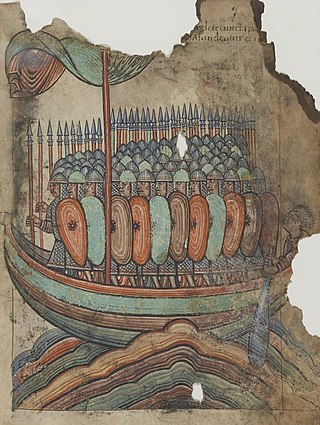
Brittany is a peninsula, historical country and cultural area in the north-west of modern France, covering the western part of what was known as Armorica during the period of Roman occupation. It became an independent kingdom and then a duchy before being united with the Kingdom of France in 1532 as a province governed as a separate nation under the crown.

Nominoe or Nomenoe was the first Duke of Brittany from 846 to his death. He is the Breton pater patriae and to Breton nationalists he is known as Tad ar Vro.

Alan II, nicknamed Wrybeard or Twistedbeard, Alan Varvek in Breton, was Count of Vannes, Poher and Nantes, and Duke of Brittany from 938 to his death. He was the grandson of King Alan the Great by Alan's daughter and her husband Mathuedoï I, Count of Poher. He expelled the Vikings/Norsemen from Brittany after an occupation that lasted from 907 to about 939.

Alan IV was Duke of Brittany from 1072 until his abdication in 1112. He was also Count of Nantes and Count of Rennes. His parents were Duchess Hawise and Duke Hoel II. He is also known as Alan Fergant. Through his father, he was of the Breton House of Cornouaille dynasty. He was the last Breton-speaking Duke of Brittany.
Conan I nicknamed Le Tort was the Duke of Brittany from 990 to his death.

Yves Lainé is a Breton lawyer, politician and companies executive manager, now a writer, arguing for the return of Loire-Atlantique departement in the administrative région of Brittany the reunification and devolution of the historical Brittany.
The counts of Nantes were originally the Frankish rulers of the Nantais under the Carolingians and eventually a capital city of the Duchy of Brittany. Their county served as a march against the Bretons of the Vannetais. Carolingian rulers would sometimes attack Brittany through the region of the Vannetais, making Nantes a strategic asset. In the mid-ninth century, the county finally fell to the Bretons and the title became a subsidiary title of the Breton rulers. The control of the title by the Breton dukes figured prominently in the history of the duchy. The County of Nantes was given to Hoel, a disinherited son of a duke. He lost the countship due to a popular uprising. That uprising presented an opportunity for King Henry II of England to attack the Breton duke. In the treaty ending their conflicts, the Breton duke awarded the county to Henry II.
Ricwin, Ricuin, Richwin, or Richovin was the Count of Nantes from 831 to 841. A Rihwinus comes witnessed the will of Charlemagne in 811.
Lambert II was the Count of Nantes and Prefect of the Breton March between 843 and 851. Lambert ruled the county in opposition to Amaury, the puppet count installed by Charles the Bald, King of West Francia. At his death, the county was effectively in Breton control. Lambert was the son of Lambert I and his wife Itta.
Renaud (795–843) was Frankish Count of Herbauges, Count of Poitiers and Count of Nantes. His name is also spelled Rainaldus or Ragenold, and he is sometimes known as Reginald in English. He is referred to as Renaud of Aquitaine, but seems to have been a member of the Rorgonid family of Maine.
Hoël I of Brittany was an illegitimate son of Alan II and Judith. He was Count of Nantes and Duke of Brittany from 960 to 981.

Alan was the only known son of Guerech, Duke of Brittany, and Aremberg. With his mother he founded the castle of Ancenis around 987, according to the Chronicle of Nantes. In 988, he succeeded his father as Count of Nantes and perhaps nominal Duke of Brittany, after his father was murdered by Count Conan I of Rennes. The following two years were marked by endless warfare between Rennes and Nantes. In 990, Alan died, either of an illness or else killed by Conan, who took Nantes and had himself proclaimed Duke of Brittany by the bishop of Nantes, Orscand de Vannes.
Budic of Nantes was Count of Nantes from 1005 to his death in 1038.
Judicaël of Nantes was Count of Nantes from 992 to his death in 1004.
Judith of Nantes was titular Countess of Nantes from 1051 to her death in 1063.
Harvey I of Léon was a Viscount of Léon.
Guihomar III of Léon was a Viscount of Léon. He succeeded his father Harvey I.
Guihomar II de Léon was a Viscount of Léon. He is said to have succeeded his grandfather Guihomar I.
Guihomar I of Léon was one of the first Viscounts of Léon. He lived c. 970 - 1055.

Vikings were active in Brittany during the Middle Ages, even occupying a portion of it for a time. Throughout the 9th century, the Bretons faced threats from various flanks: they resisted full incorporation into the Frankish Carolingian Empire yet they also had to repel an emerging threat of the new duchy of Normandy on their eastern border by these Scandinavian colonists.






